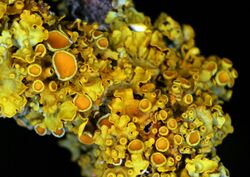Biology:Xanthoria
From HandWiki
Short description: Genus of lichens in the family Teloschistaceae
| Xanthoria | |
|---|---|

| |
| Xanthoria parietina | |
| Scientific classification | |
| Domain: | Eukaryota |
| Kingdom: | Fungi |
| Division: | Ascomycota |
| Class: | Lecanoromycetes |
| Order: | Teloschistales |
| Family: | Teloschistaceae |
| Genus: | Xanthoria (Fr.) Th.Fr. (1860) |
| Type species | |
| Xanthoria parietina (L.) Th.Fr. (1860)
| |
| Species | |
|
See text | |
| Synonyms[1] | |
|
List
| |
Xanthoria is a genus of lichenized fungi in the family Teloschistaceae.[2] Common names include orange lichen,[3] orange wall lichen,[4]:134 and sunburst lichen.[4]:134 They can be identified by their characteristic squamulose morphology with distinctive "fairy cups".
Species
(As of October 2023), Species Fungorum (in the Catalogue of Life) accepts 19 species of Xanthoria.[5]
- Xanthoria aureola (Ach.) Erichsen (1930)
- Xanthoria calcicola Oxner (1937)
- Xanthoria coomae S.Y.Kondr. & Kärnefelt (2007)
- Xanthoria ectaneoides (Nyl.) Zahlbr. (1931)
- Xanthoria hypogymnioides S.Y.Kondr. & Kärnefelt (2007)
- Xanthoria ibizaensis S.Y.Kondr. & A.S.Kondr. (2020)
- Xanthoria juniperina S.Y.Kondr. (2013)
- Xanthoria kangarooensis S.Y.Kondr. & Kärnefelt (2009)
- Xanthoria lapalmaensis Schumm & S.Y.Kondr. (2017)
- Xanthoria parietina (L.) Th.Fr. (1860) – common orange lichen, yellow scale, maritime sunburst lichen, shore lichen[6]
- Xanthoria polessica S.Y.Kondr. & Yatsyna (2013)
- Xanthoria rutilans (Ach.) S.Y.Kondr. (2002)
- Xanthoria schummii S.Y.Kondr. (2017)
- Xanthoria splendidula (Zahlbr.) Makryĭ (2007)
- Xanthoria ulophyllodes Räsänen (1931) – powdery sunburst lichen[6]
- Xanthoria whinrayi S.Y.Kondr. & Kärnefelt (2007)
- Xanthoria yorkensis S.Y.Kondr. & Kärnefelt (2009)
The taxa Xanthoria coomae S.Y.Kondr. & Kärnefelt (2007) and Xanthoria polessica S.Y.Kondr. & Yatsyna (2013) were determined to be the same species as X. parietina in a 2020 publication.[7] The taxon once known as Xanthoria elegans is now Rusavskia elegans, the type species of genus Rusavskia.[8]
References
- ↑ "Synonymy. Current Name: Xanthoria (Fr.) Th. Fr., Lich. arct. (Uppsala): 66 (1860)". Species Fungorum. http://www.speciesfungorum.org/Names/SynSpecies.asp?RecordID=5811.
- ↑ Wijayawardene, N.N.; Hyde, K.D.; Dai, D.Q.; Sánchez-García, M.; Goto, B.T.; Saxena, R.K. et al. (2022). "Outline of Fungi and fungus-like taxa – 2021". Mycosphere 13 (1): 53–453. doi:10.5943/mycosphere/13/1/2. https://www.researchgate.net/publication/358798332.
- ↑ Xanthoria. USDA PLANTS.
- ↑ 4.0 4.1 Field Guide to California Lichens, Stephen Sharnoff, Yale University Press, 2014, ISBN:978-0-300-19500-2
- ↑ "Xanthoria". Species 2000: Naturalis, Leiden, the Netherlands. https://www.catalogueoflife.org/data/taxon/88H3.
- ↑ 6.0 6.1 Waleski Joe (2007). Lichens of the North Woods Duluth, MN: Kollath+Stensaas
- ↑ Tsurykau, Andrei; Bely, Pavel; Arup, Ulf (2020). "Molecular phylogenetic analyses reveal two new synonyms of Xanthoria parietina". Plant and Fungal Systematics 65 (2): 620–623. doi:10.35535/pfsyst-2020-0033.
- ↑ Arup, Ulf; Søchting, Ulrik; Frödén, Patrik (2013). "A new taxonomy of the family Teloschistaceae". Nordic Journal of Botany 31 (1): 16–83. doi:10.1111/j.1756-1051.2013.00062.x.
Wikidata ☰ Q2452375 entry
 |

